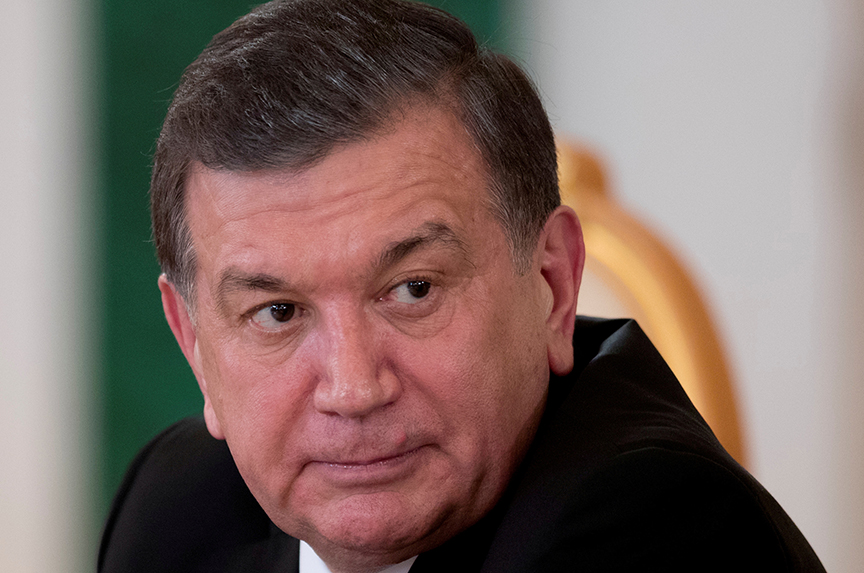When Shavkat Mirziyoyev was elected president of Uzbekistan in December of 2016 it was widely believed that he would continue the legacy of his predecessor, Islam Karimov, who ruled the country for twenty-five years until his death.
Instead, Mirziyoyev has charted a fiercely independent foreign policy that aims to mend ties with Uzbekistan’s neighbors and boost its economy.
Mirziyoyev outlined his foreign policy first in his address to the United Nations General Assembly on September 19, 2017, and then at a regional conference in Samarkand on November 11, 2017.
First, Mirziyoyev’s chief priority is to boost Uzbekistan’s flagging economy. In order to achieve this goal, Uzbekistan must work with its neighbors to resolve outstanding border and water issues, restore energy cooperation and transport infrastructure, and liberalize a visa regime.
Mirziyoyev is tackling decades-old problems that Karimov was reluctant to touch. He has started with the least problematic of the challenges—Kyrgyzstan. For Tashkent, reinvigorating its relationship with Bishkek is a test of its tactics with other states in the region.
At a meeting with then Kyrgyz President Almazbek Atambayev in September of 2017, Mirziyoyev boldly suggested that problems between the two countries that have lingered for the past two decades would be resolved soon. In September 2017, Tashkent and Bishkek signed an interim border agreement and the Uzbek company Uzbekhydroenergo agreed to participate in the construction of Kambarata HPP-1 hydropower project.
Second, Mirziyoyev understands the importance of having uninterrupted transport links with his neighbors. This will help expand trade and allow Uzbekistan to increase the volume of its exports. The Central Asian countries should work together within the framework of the Chinese infrastructure project, the One Belt One Road Initiative.
Third, Uzbekistan faces food security challenges. Uzbeks’ purchasing power has rapidly declined while food prices are significantly lower in the bordering cities of Kazakhstan. For the first time since the easing of travel across the border with Kazakhstan, Uzbek consumers have begun to travel to Kazakhstan to buy food.
Fourth, Uzbekistan’s energy needs are growing and its economy has been hurt by disrupted energy ties. Mirziyoyev has tried to resolve issues of fuel supplies through Turkmenistan. During his state visit to Turkmenistan in March 2017, the Uzbek state energy company O’zbekNeftGaz and the Türkmennebit (Turkmen Oil) signed a memorandum on joint exploration and development of deposits in the Turkmen sector of the Caspian Sea. As a result, the Uzbek company will conduct geological exploration work abroad for the first time in its history. Moreover, Tashkent stated that it is ready to participate in the TAPI project, an energy project that involves the export of Turkmen gas to Afghanistan, Pakistan, and India. However, Uzbekistan’s role in the project is unclear.
In March of 2018, Mirziyoyev made a historic visit to Tajikistan. It was the first state visit by an Uzbek leader to Tajikistan since the countries’ independence after the fall of the Soviet Union in 1991.
Mirziyoyev signed agreements with his Tajik counterpart, Emomali Rahmon, on border demarcation, the liberalization of visa regimes, and, most importantly, a first-of-its kind silent agreement on construction of the Rogun Dam. Construction of the dam was a point of contention in the relationship between the two countries as it would limit the amount of water available to Uzbek farmers.
Moreover, Uzbekistan and Tajikistan agreed to cooperate on energy. Due to the complex geography of the two countries, Uzbekistan will provide energy to the remote territories of Tajikistan, while Tajikistan will supply electricity to neighboring Uzbek rural areas.
Uzbekistan’s recent warming of relations with its neighbors is based on a pragmatic approach that was unthinkable under Karimov. Mirziyoyev has made it clear to his counterparts in the region that an outside mediator is not required to resolve regional political disputes.
The meeting of the heads of four Central Asian states and a top Turkmen official in Astana on March 15 was historic even though the leaders emphasized the consultative nature of the event. For the first time in twenty years, representatives from these countries gathered independently and not within the frameworks of the Commonwealth of Independent States (CIS), Shanghai Cooperation Organisation (SCO), or platforms like the C5+1—a platform to address common challenges faced by the United States and the five Central Asian states.
Mirziyoyev has set an extremely ambitious agenda. Ambitious plans do not always coincide with real opportunities and realities in the region. An independent integration model in Central Asia, which can be free from Russia’s influence, is not a priority for the United States or the European Union (EU). Kazakhstan and Kyrgyzstan are part of the Eurasian Economic Union, which is led by Russia. Turkmenistan is not going to give up its neutrality anytime soon.
Tashkent is not in a position to alone change the situation in the region. It will require the support of another major Central Asian state—Kazakhstan. Thus, the new model of cooperation in Central Asia, proposed by Tashkent, can be successful only if Uzbekistan works in a tandem with Kazakhstan. A failure to do so means Mirziyoyev’s goals will remain unfulfilled.
Aziz Egamov is an intern in the Atlantic Council’s Eurasia Center.
Rafael Sattarov is an expert on Central Asia at the Carnegie Moscow Center.
Image: Uzbekistan’s president, Shavkat Mirziyoyev, addressed the United Nations General Assembly in New York on September 19, 2017. (Reuters/Eduardo Munoz)
